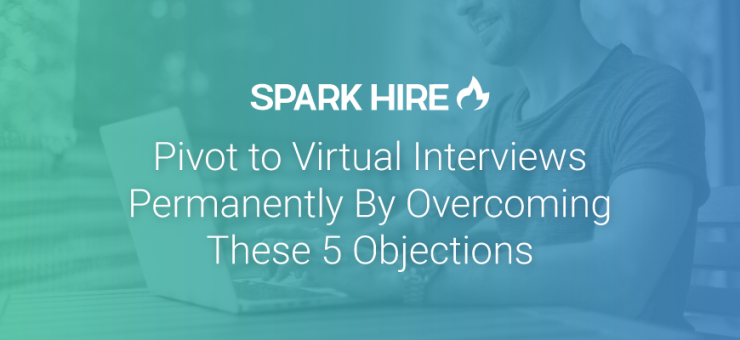Each step you take in the hiring process is carefully planned. Not just by you, but by the many members of your team who have critical roles in sourcing, interviewing, hiring, and onboarding the right candidates for your company.
Unfortunately, there are times when all voices in the process don’t agree on tools and procedures. This can lead to slowed hiring times, a disjointed team, and even disagreements over who to hire.
Virtual interviews are no exception when it comes to hiring team controversy. Of course, we’ve heard every objection in the book. However, many leaders have this overcome reluctance in a variety of ways.
Find out what these leaders did when their hiring teams offered up virtual interview objections:
1. You’ll lose the personal aspect
 I wanted to move our hiring process online because I thought it would streamline the steps and save us time. However, my business partner didn’t think this was a good idea because he thought we’d lose the personal aspect of interviews. In turn, this might increase the amount of bad hires we make.
I wanted to move our hiring process online because I thought it would streamline the steps and save us time. However, my business partner didn’t think this was a good idea because he thought we’d lose the personal aspect of interviews. In turn, this might increase the amount of bad hires we make.
Ultimately, we came to a compromise. The first two interviews we conduct are now via video. If the candidate passes through to the third and final round, we bring them into the office for an in-person sit down so we can get a holistic feel for their personality.
Matthew Ross, Co-founder and COO of The Slumber Yard
 Bad hires are a costly cause for concern, which is why it’s important to make a connection with candidates throughout the entire hiring process. Personalize virtual interviews with company logos, a background that highlights the company culture, and don’t forget to leave time for candidates to open up and ask questions.
Bad hires are a costly cause for concern, which is why it’s important to make a connection with candidates throughout the entire hiring process. Personalize virtual interviews with company logos, a background that highlights the company culture, and don’t forget to leave time for candidates to open up and ask questions.
2. You can’t study the candidate’s body language
 The journey to switching to virtual interviews was not smooth because we received many objections. The most common complaint was that there would be a lack of physical interaction, making it challenging to study the candidate’s body language.
The journey to switching to virtual interviews was not smooth because we received many objections. The most common complaint was that there would be a lack of physical interaction, making it challenging to study the candidate’s body language.
While reading body language certainly helps us judge a candidate’s character and potential, it is not a tell-all sign of their competence. Without body language, there are still facial reactions, gestures, tone of voice, speech delivery, and more factors hiring managers can use to assess candidates.
Jeremy Owens, CMO of Seriously Smoked
 Being able to review a candidate’s whole-self, including their body language, is one of the top advantages of virtual interviews. Read more about how to decipher body language during a video interview.
Being able to review a candidate’s whole-self, including their body language, is one of the top advantages of virtual interviews. Read more about how to decipher body language during a video interview.
3. It’s difficult for people to express themselves
 One of the biggest objections I’ve encountered regarding virtual interviews is that it can be
One of the biggest objections I’ve encountered regarding virtual interviews is that it can be
difficult for people to express themselves naturally online. This can be detrimental to their chances of obtaining a position they’re actually qualified for.
It’s true, some people can be a little standoff-ish, but the longer you spend talking to them, the more comfortable one tends to be.
Andrew Taylor, Director at Net Lawman
You, of course, want candidates to feel as comfortable as possible during virtual interviews. Send candidates branded video messages with interview preparation details, a timeline of events, and how they can ensure their equipment is working properly before they begin. This sends a warm message and helps calm nerves prior to the actual interview.
4. There’s an inability to determine candidate’s capabilities
 Our managers were concerned the lack of face-to-face interaction would give them far less of an ability to read the candidate. The concern is valid, as there’s a great deal candidates communicate in person through body language and other subtle cues. But I believe if the right approach is taken, interviewers can still get to know if candidates are the right fit.
Our managers were concerned the lack of face-to-face interaction would give them far less of an ability to read the candidate. The concern is valid, as there’s a great deal candidates communicate in person through body language and other subtle cues. But I believe if the right approach is taken, interviewers can still get to know if candidates are the right fit.
All of our managers were trained not just in the use of the virtual interviews and hiring management software, but also in the approach to take. We made certain they were more direct, asking exactly what they needed to know so they could get answers that would help them determine the candidate’s viability.
Jennifer Walden, Director of Operations of WikiLawn Lawn Care
 Determining a candidate’s capabilities relies on your interview process — whether you’re performing in-person, virtual, or a mixture of both. Learn more about how a structured interview process enhances your ability to assess candidates.
Determining a candidate’s capabilities relies on your interview process — whether you’re performing in-person, virtual, or a mixture of both. Learn more about how a structured interview process enhances your ability to assess candidates.












